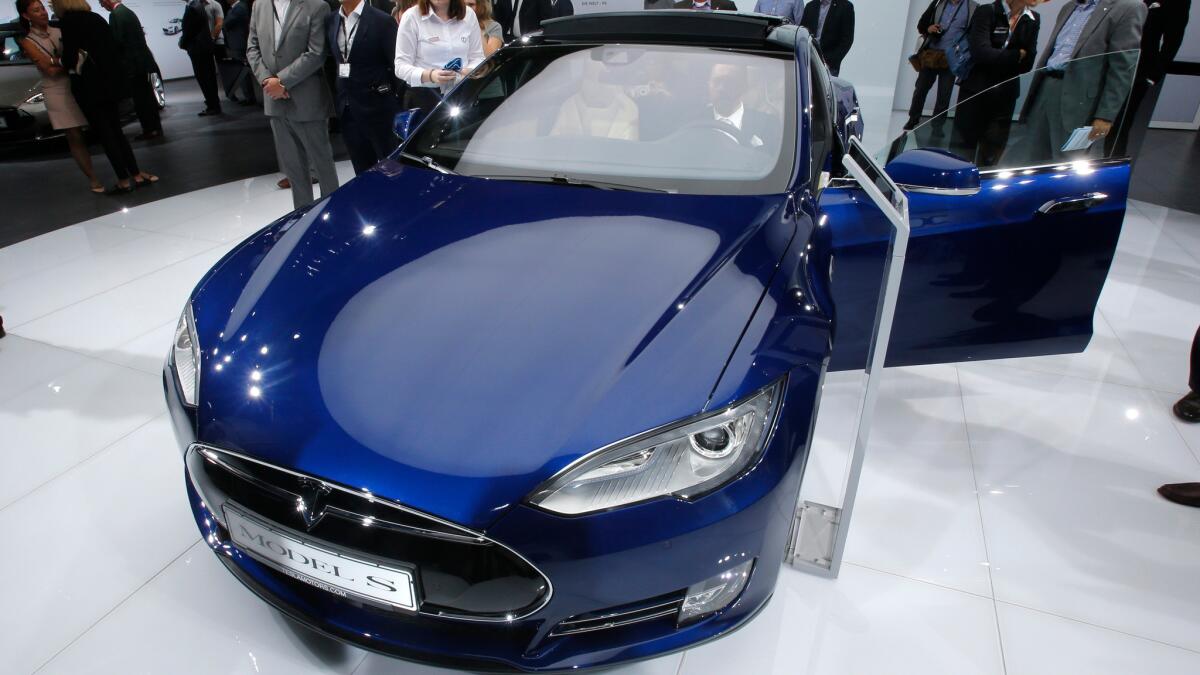Consumer Reports to Tesla: Disable automatic steering and quit calling it Autopilot

A Tesla Model S is displayed at an auto show in Frankfurt, Germany, in 2015.
- Share via
Consumer Reports called on Tesla Motors Inc. on Thursday to disable automatic-steering capabilities in its electric cars and stop using the name Autopilot for its semi-autonomous driving technology.
Tesla declined.
The technology is under intense scrutiny following the May 7 death of a driver who was using the Autopilot feature on his Tesla Model S sedan when it crashed into a tractor-trailer in Florida.
Federal safety regulators are investigating the crash and Tesla’s Autopilot feature, which uses cameras, radar and sensors to automatically steer the car and adjust speeds.
The Palo Alto, Calif.-based automaker, run by Elon Musk, has emphasized that Autopilot is still in a beta phase of introduction and has limitations. It says Tesla drivers are warned to stay alert and keep their hands on the steering wheel because the technology does not provide fully autonomous driving.
Consumer Reports said in a statement on its website that “these two messages — your vehicle can drive itself but you may need to take over the controls at a moment’s notice — create potential for driver confusion.”
“It also increases the possibility that drivers using Autopilot may not be engaged enough to react quickly to emergency situations,” the magazine said.
Consumer Reports urged Tesla to disable its automatic-steering operation “until it can be reprogrammed to require drivers to keep their hands on the steering wheel” and to “stop referring to the system as ‘Autopilot’ as it is misleading and potentially dangerous.”
But Consumer Reports said Tesla responded to its request by saying that “while we appreciate well-meaning advice from any individual or group, we make our decisions on the basis of real-world data, not speculation by the media.”
“Tesla also defended the safety record of the system, writing that ‘130 million miles have been driven on Autopilot, with one confirmed fatality,’” Consumer Reports said.
Tesla reiterated that statement to The Times and added in an email that “Tesla Autopilot functions like the systems that airplane pilots use when conditions are clear. The driver is still responsible for, and ultimately in control of, the car. This is enforced by onboard monitoring and alerts.”
Rob Enderle, president of the technology strategy firm Enderle Group Inc., said he favored dropping the Autopilot name because “Autopilot does lead people to believe the system does something it doesn’t.”
But Enderle said he was “not convinced the [auto-steering] feature needs to be disabled. I am convinced people need to know how to properly use it.”
The Consumer Reports report came a day after Tesla confirmed that it had ended its resale-guarantee program in North America.
The program, which began in 2013, guaranteed that Tesla vehicles would have a higher resale value after three years than premium sedans from manufacturers such as BMW and Mercedes-Benz.
Musk personally backed the program, saying he wanted to give buyers peace of mind. Buyers who used Tesla financing were eligible.
A Tesla representative said Wednesday that the program reassured customers in Tesla’s early years when its cars didn’t have a track record, but Tesla sedans are now holding their value even better than the resale value guarantees, so the program is no longer necessary.
Tesla’s stock closed Thursday down $1, or less than 1%, to $221.53.
The Associated Press contributed to this report.
Twitter: @PeltzLATimes
ALSO
Tesla’s ‘autopilot mode’ puts it at risk for liability in crashes
Elon Musk tweets he might unveil ‘Top Secret Tesla Masterplan’ this week
Tesla is said to be under investigation by the SEC for failing to disclose a fatal crash
UPDATES:
1:47 p.m. This article was updated with Tesla’s closing stock price.
12:56 p.m.: This article was updated with remarks from Rob Enderle, president of the technology strategy firm Enderle Group Inc., and with details of Tesla discontinuing its resale-guarantee program in North America.
10:09 a.m.: This article was updated throughout with Times staff reporting.
This article was originally published at 9:04 a.m.
More to Read
Inside the business of entertainment
The Wide Shot brings you news, analysis and insights on everything from streaming wars to production — and what it all means for the future.
You may occasionally receive promotional content from the Los Angeles Times.











